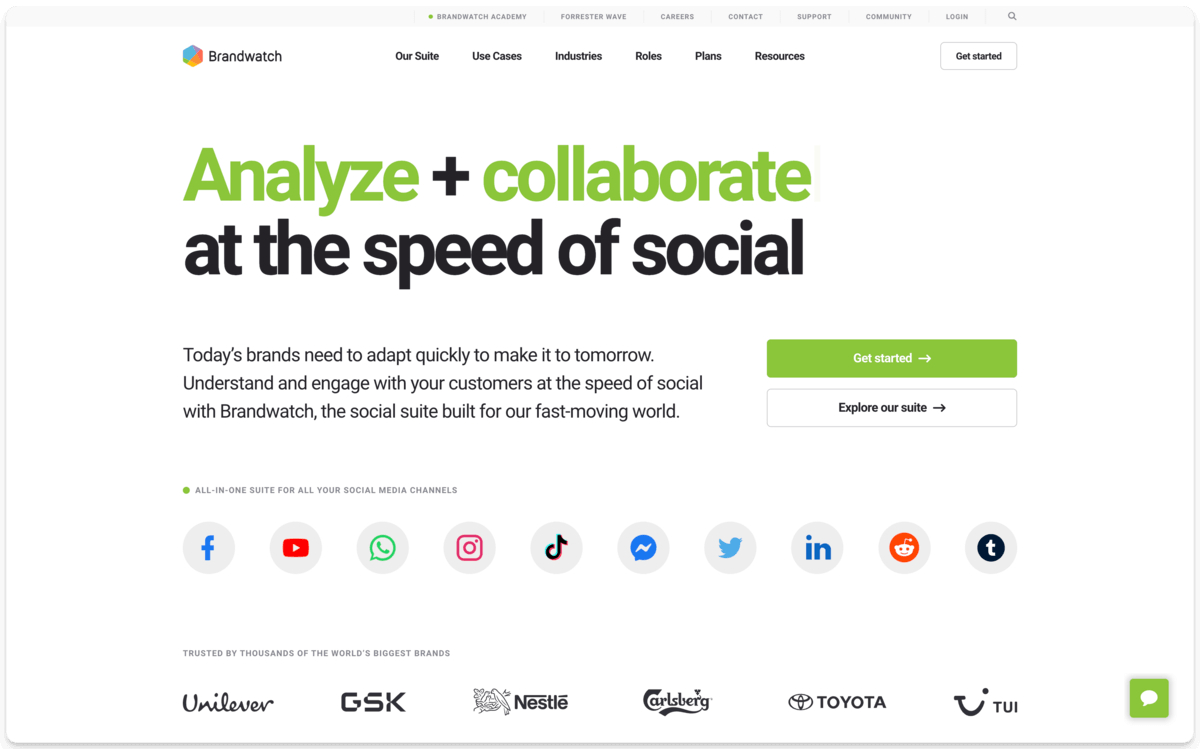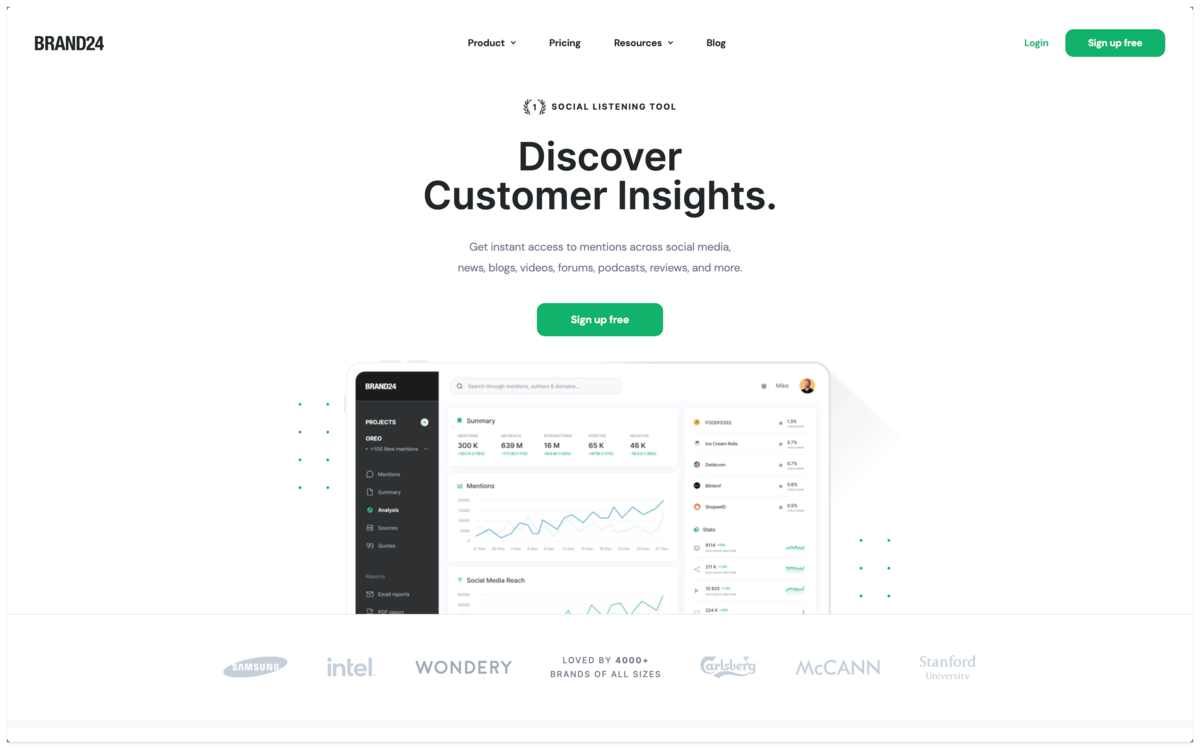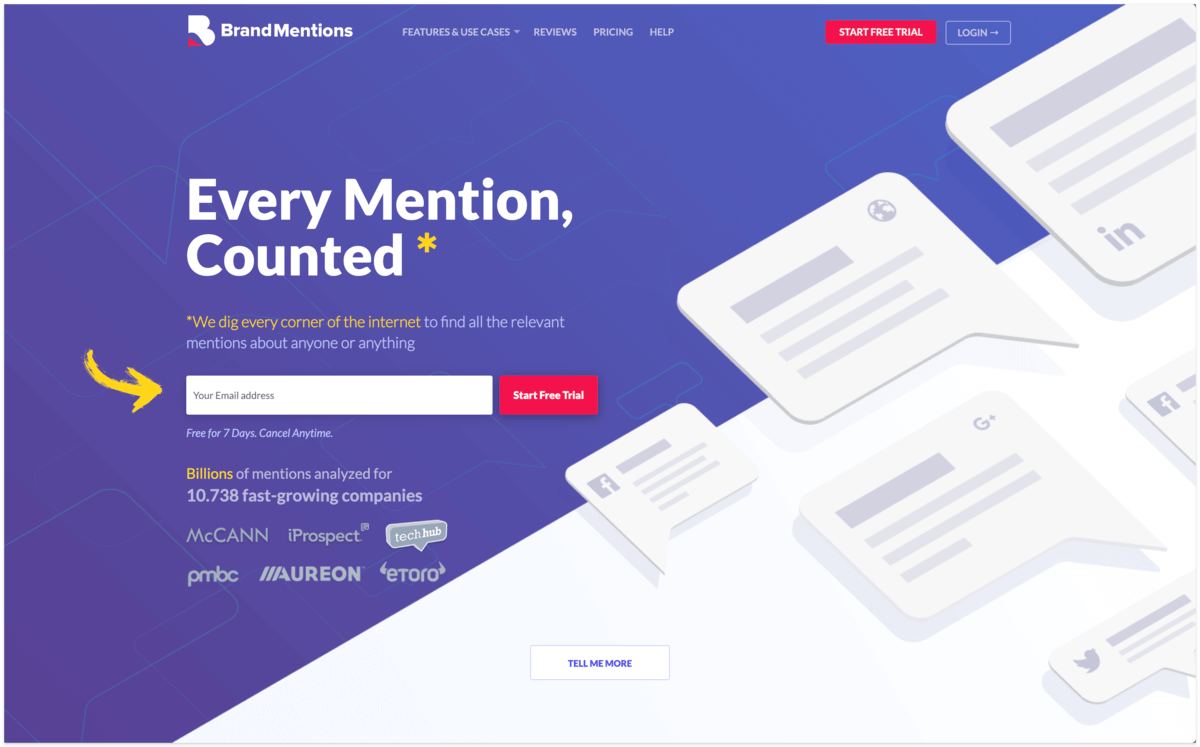
BLOG
Branding for Startups in 2023: From Unknown to Unforgettable
Table of contents
Click on a title to jump to a section
Standing out is difficult for any business, regardless of the market they’re trying to break into. This is why a branding strategy is essential for businesses, including startups.
Branding is about creating a unique identity for your business. A good brand stands out from the crowd. When people see your brand, they know what to expect. We’ll go over the key points and the basics of branding for startup businesses. This includes giving you basic branding strategies, as well as identifying the reasons why your business needs a brand.
What Is Branding?
Branding is a tough concept to explain because it encompasses everything about a business. The way the business operates, its logos, the brand story, the colours associated with the business, the products it sells, and more. Anything that identifies your business as being different from another brand is part of ‘branding’.
Take McDonald’s, for example. One of the biggest brands in the world. When people see a McDonald’s, they know exactly what to expect from it. Cheap burgers and fries, which taste roughly the same no matter which country you are in. See a big yellow M? You know that you are looking at a McDonald’s.
Building a brand is about developing an identity for your business. When you create your brand’s identity, you are reminding people of what to expect from your company when they buy from you. Every business that aims to be successful needs a brand. Marketing campaigns should be targeted at the brand. Having a brand is the best way to stand out in an incredibly competitive market. When you have a new company, you should work on developing the brand right away. A digital marketing agency is a great way to kickstart your brand’s journey
Why Is Branding Important for Startups? – 5 Key Reasons
Having a brand strategy is important for any startup. The startup market is undoubtedly competitive, but the companies that take the time to establish their brands early in their existence stand a much better chance of succeeding.
Working on brand positioning needs to be a day-one priority for all startups. This is because everything about the business is going to be built around the brand. The products, the images, the logos, and the way in which you offer customer support. The brand feeds into everything, and establishing those brand guidelines early on can really help build a business.
Earn Trust: The Power of a Strong Brand

The biggest brands in the world spend a lot of time working on their brands because it helps increase trust in the product, and start-ups should do the same. Let’s give an example of how brand trust helps.
Imagine you are faced with a purchasing dilemma, where two products appear nearly identical. Many items are manufactured in the same factories, exhibiting minimal variation among them. One of these products bears the emblem of a renowned brand, a name with which you are familiar. On the other hand, there is an unbranded alternative available at a lower cost, offered by an unknown business. Despite being identical in every aspect, you would most likely opt for the more expensive product. This choice stems from the trust you have in the reputable brand. You believe that they consistently deliver exceptional products and provide commendable customer service.
This is how building up a startup brand works. When you come up with a brand strategy for your business, you are trying to convince people that your company is trustworthy. You want people to know what to expect from your startup’s brand. If you can establish a quality brand that can be trusted, then you will have a much greater chance of success.
Stand Out: How Branding Can Differentiate Your Startup

Each day, new startups are being founded. We don’t care what type of industry your startup is in. We are 100% sure that there are businesses already offering similar products to yours. As a new startup, you are going to find it very tough to stand out.
Branding helps differentiate your brand from the competition. A successful brand communicates exactly what the company offers. It tells people why that business is unique and ‘better’ than the competing businesses.
Remember what we said about McDonald’s branding at the start? Think about their brand. Think about what that brand says to you when you think of it. Now think of any other brand that also sells burgers. Let’s say, Burger King, as they are also global. Think about what their brand represents. While there is some overlap between the McDonald’s brand and the Burger King brand, you will also start to notice differences. Differences that set these competing businesses apart.
Everything about your business will be focused on establishing why you are unique: website design, brand tone and language, logos, product designs, everything.
Create Fans, Not Just Customers: The Loyalty-Building Benefits of Branding

Successful brands are almost human. They have what is known as a “brand personality.” The brand personality is the unique characteristic that helps identify that brand. The business may want to be seen as fun and hip, or it may want to be seen as professional, and very focused on the task at hand.
If you use platforms like Twitter, we suggest that you follow the accounts of some of the biggest brands in the world. You will notice that they each talk in their own specific way. While there may be multiple people behind the same account, they will always talk with the same “voice.”
When a brand’s personality is developed, people start to form an emotional connection with it. You have probably seen this happen before. You may have a fierce loyalty to Apple, or you may have a fierce loyalty to Android.
When you build up that emotional connection, you build loyalty with potential customers. That link can lead to your potential customers recommending your products. Take the “phone wars,” for instance. If somebody criticises Apple products, you will always have somebody rushing in to defend. Apple customers (fans) are boosting Apple’s brand for free, for Apple’s benefit!
Be Seen: How Brand Recognition Can Boost Your Startup’s Visibility

Your website is the face of your business online, and it often provides the first impression of your brand to potential customers. It’s your digital storefront where visitors learn about your business, your products or services, and how they can benefit from what you’re offering.
One critical aspect of a successful website is its design. A well-designed website can significantly increase business growth, enhance user experience, and convert visitors into customers. A poorly designed website, on the other hand, can deter potential customers and harm your brand’s image.
To establish a successful online presence, startups need to invest in professional website design. This brings us to an important question: how much does a website cost? This is a crucial aspect to consider when budgeting for your startup.
A company’s success online is significantly tied to its website’s quality. So, consider the cost of a website as an investment in your brand’s future, because that’s exactly what it is. Remember, the quality of your website reflects the quality of your brand. Design it well, and it will serve you well.
Fueling Growth: The Business Benefits of Strong Branding

You already know by now that a good brand strategy can help a startup brand grow rapidly. When a brand establishes itself as trustworthy, it’s easier to attract customers. Successfully branding a business never stops, though. It is part of a long-term marketing tool.
A successful brand will be the foundation of all future marketing strategies. Not just the marketing campaigns that you launch now, but the ones that you could be launching decades down the line.
A good brand will give a voice and visual identity to any marketing materials. It will determine who the marketing campaigns will be directed at. It will determine how the ads are run.
A good brand will also determine the way your company is run. Early on in the startup game, you will be working on establishing your company’s values. Using your brand strategy for guidance, you can attempt to keep following the values of your company, even as the business expands. You don’t want to lose track of the identity of your business, after all.
How to Build a Strong Brand for Your Startup: A Guide to Effective Startup Branding in 2023
This is the tricky part. Branding is hard. Even the big companies are constantly giving themselves headaches trying to figure out how to further develop their brands. It is much, much more difficult for a new business that doesn’t quite know what its brand identity is.
This section is meant to help you. We want to give you some quick tips and tricks for helping to build a startup brand.
Crafting Your Unique Brand: Defining Brand Identity
Your brand identity will form the basis of your branding strategies. It is how you want your business to be seen by potential customers. You want a brand that resonates with potential customers. If you can create that, then making sales and building up customer loyalty are much easier.
Your brand identity will be determined by three things:
- Your Mission Statement: The mission statement is a fundamental part of your brand identity. It outlines what your business is all about, what it hopes to achieve, and how it plans to do so. It’s a declaration of your company’s purpose and sets the stage for everything else that follows. This statement should answer key questions such as: What does your business do? What makes it different from others? What is the main aim of your business?
- Brand Values and Personality: This encompasses the core beliefs that drive your business, along with the distinct character it embodies. Your brand values are the guiding principles that influence your business decisions, shape your company culture, and ultimately determine how your brand interacts with the world. Are you committed to sustainability, innovation, integrity, customer satisfaction, or inclusivity? Your brand values should resonate deeply with your target audience and differentiate you from competitors.
- Target Audience: Understanding your target audience is an indispensable aspect of crafting your brand identity. This represents the specific group of people you aim to reach with your products or services. It’s not just about who they are demographically – their age, gender, location, income level – but also their psychographics: their interests, behaviours, values, and lifestyles.
Know Your Market: Conducting Market Research
A lot of startups go into business thinking they know exactly who their target audience is. This is rarely the case. Take Facebook, for example. The original intention of Facebook was to bring college students together. It is now the largest social media site that brings businesses and people together. A completely different market than what was originally intended. If Facebook had stuck with who it believed to be its target market, it wouldn’t have been successful. The company would likely have gone bankrupt.
This is why it is so important to conduct market research. You may think you know who your market is, and you could be right, but you need to verify it. Once you have done your market research, you can start to put together your brand identity.
Identifying your target audience is normally done through intense amounts of research online, surveys, and even looking at what competing businesses are doing. When you carry out your market research, you will start to learn about needs, average age, income level, etc. All of this can provide guidance on your brand’s voice.
Look the Part: Creating a Striking Visual Identity
We know we keep bringing up McDonald’s, but they are the largest and most recognisable brand in the world. They are also a great example of why startup branding should heavily focus on visual identity.
We can almost guarantee that, without looking it up, you will know that McDonald’s logo is a big yellow M on a red background. Whenever you see a yellow M in the wild, especially alongside the colour red, you may think of McDonald’s, even if you are not actually looking at the McDonald’s logo. That is an example of a powerful brand. It is an example of a good visual identity.
A small business looking to become a big business in a few years really needs to work on building up a style guide for its visual identity. They need to come up with a colour scheme that will remain consistent throughout their marketing materials, and a simple logo that reminds people of the brand.
Many businesses will produce a comprehensive guide to how their branding works. Even as a small business, you should be writing a guide like this. This will serve to remind you of how to use your logos and brand colours. The more consistent you are, the more likely you are to have your brand resonate with your target market. Remember, hiring marketing agencies that provide branding services and good graphic designers can really help you develop the story and visual imagery behind your brand.
Finding Your Voice: Establishing a Memorable Brand Voice
Your brand needs a voice, a unique style that resonate with your audience. A type of content that you share on social media. As we mentioned earlier, your brand needs to have a personality. When you develop a personality for your brand, you can create an emotional connection with customers that can boost loyalty and sales.
It is important to have a consistent brand voice. You can’t have something that reads professionally one minute and then is full of jokes the next. It is annoying to customers, and it really confuses what your brand offers.
At an early stage of your business, you need to establish what you want the voice of your business to be. Many startups will put together a style guide that they can share with their content creators. You should do the same.
It would also help to have only a few people write or produce content for your website. This makes it easier to maintain a consistent voice, and it involves less ‘training’ people to write for you. Invest in quality copywriting, and you have a much better chance of getting a consistent voice for your company.
Content that Connects: Developing a Strategy to Reach Your Audience
It is all well and good to create content, but the content has no value unless you know how to get it out there. So, sharing content should be a key component of your branding strategies.
When you are developing your brand identity and your brand voice, you will likely start to come up with ideas for your brand’s identity. For example, if your startup targets ‘new’ people in a niche, then your content will likely be much more basic and focus on core concepts. If you are targeting professionals, then your content will be less focused on the how-to, and more on an in-depth discussion about the industry. Your target market will always be your guide when creating content.
It is important that you learn how to create engaging content for your target market. Something that will make them want to read or share that content. The more a person interacts with your content, the more they will resonate with your brand and learn its value. Remember, poor-quality content will have a negative impact on your brand. Poor-quality content shows that your business doesn’t have a clue what it is doing.
You should be heavily promoting your content through social media channels, or other places where your target audience may be. Remember, you will need to use different platforms depending on who you want to read your content.
Copywriting or SEO services can really help with content marketing. Your website should be filled with quality and relevant articles. You should have a content marketing strategy that involves getting articles about your startup on niche-specific websites (a press release can help here).
Getting Noticed: Building Brand Awareness That Sticks
If you want your brand’s awareness to stick, you need to be constantly marketing your business. You should constantly be working on your brand. Even the largest companies in the world invest heavily in marketing. They know that if they stop for even a short while, people will start picking up products from their competitors.
There are a variety of ways that you can boost your brand awareness, and the methods that you use will be determined by your branding strategy or any guidance that you have received from a startup branding agency. However, the following methods have been known to help:
- Social media marketing will keep your brand visible to anyone who has engaged with your brand before. Social media marketing will constantly remind people that your brand exists and the values that it stands for.
- Release press releases that get shared on various news websites, especially those related to your niche. Press releases often share core components of the brand identity, as well as information about new products or changes to the way a business is run.
- Certain businesses may want to form relationships with influencers. Multiple influencers, in fact. Influencers can remind people of a brand. Remember, a lot of this content is still being viewed years after it was created, so working with influencers can be a great investment.
- Keep up with your marketing campaigns. You don’t have to focus on new product launches or anything. Just focus on promoting the core concepts of your brand.
Beyond the Numbers: Measuring Your Brand’s True Impact
It is important that you keep tabs on the success of your brand. You want to know whether you are targeting the ideal customers for your brand. If you aren’t reaching the ideal customer for your business, then you can come up with ways to deal with that problem.
Remember what we said? It isn’t uncommon for new startups to focus on the wrong target market. They spend a lot of money advertising to people who don’t really care about their business. This can put off potential investors, as if a business doesn’t understand who their product is for, how can they trust that company to deliver a return on their investment.
Brand Awareness
Brand Loyalty
Customer Engagement
Brand Awareness
How aware are people of your brand? If you asked them about your brand, would they be able to tell you what your brand is about? Can they even tell you what your company offers? If they can’t, you have low brand awareness.
If people are engaging with the content that you create, then you have a good brand. Well, perhaps. You need them to be engaging in a positive way. This may be sharing insightful comments, reviewing your business, sharing your business, etc.
How to Track Your Brand Metrics
While keeping an eye on sales data, customer engagement on social media, etc. can provide some insight into how your brand is performing, it won’t tell the full story. This is why, if you are serious about building up your brands, you need to invest in a quality brand tracking tool. Some of the most popular include:
Brandwatch

Brandwatch is a top brand tracking tool that monitors social media channels and tracks over 600 metrics. It provides access to 12 years’ worth of data and offers custom reports, enabling you to gain valuable insights into your brand’s performance. By analysing the data, you can optimise your branding strategy, produce more engaging content, and address any negative feedback or areas for improvement. Brandwatch empowers you to make data-driven decisions and adapt your brand to better serve your target market.
Brand24

Brand24 distinguishes itself as a highly regarded brand tracking tool, trusted by major companies such as Twitter. Its comprehensive monitoring capabilities span social media channels, podcasts, forums, and reviews, providing a holistic view of your brand’s online presence. It offers real-time tracking and delivers valuable insights on both positive and negative engagements, allowing you to proactively address issues and nurture brand loyalty.
BrandMentions

BrandMentions sets itself apart as a powerful brand tracking tool with its extensive web coverage and comprehensive insights. It monitors various online platforms, including websites, social media, news articles, and blogs, enabling you to identify potential target markets and discover new audiences engaging positively with your brand.
Remember, tracking data is important. However, you need to know what to do with it once you have it. It can help tailor your branding strategy. For example, if you find certain pieces of content attract more engagement, then produce more of that type of content.
If you are finding that you are getting lots of negative comments about a certain part of your business, then work out how you can improve it (or stop the noise). If a previously unknown audience is engaging positively with your brand, then work out how you can pivot your brand to satisfy that target market more.
How Can AI Help Startups with Branding?

AI is a big deal right now, and a new business can take advantage of AI to build up its brand. At least the foundational elements of their brand. Lots of companies, both large and small, are using AI to create a much more data-driven approach to building up their brands or marketing campaigns.
AI can analyse how your brand is performing. It can analyse who your content is resonating with and provide you with suggestions on how to improve your brand or guidance on what you are doing right.
For example, AI can be used to tailor content specifically to the reader. Think of it as creating highly personalised content. It can even build this content around your unique brand voice.
It can also be used with:
- SEO can help businesses to identify trending keywords, and topics. If something is trending, then it may be worth building a brand around it.
- Advertising campaigns can use AI to create highly-targeted ads with very little user input. If the AI determines certain parts of a brand are getting more engagement, it can try to incorporate them into the campaign.
- Designs, including logos, brand images, etc. can be created with AI. Just feed in your brand identity information, and you can get something unique for your business. Building quality images to boost your brand has never been easier.
- You can even use AI to build a website or design the UX for an app in line with your brand. Just feed in data about your target market, and it can come up with something cool.
Remember, modern AI is still in its infancy. As AI technology becomes more sophisticated, expect more and more companies to try and incorporate it when working on building up their company’s branding.
Conclusion
Developing a brand identity is important for a startup to thrive. It can help businesses stand out in crowded markets and drive sales by developing loyalty toward that brand.
A lot of the early days of a startup should be focused on developing a brand identity. This is because the brand identity will guide everything that your company does, from the way any app that you design is laid out to the way that you market to your target market. The earlier you identify your brand identity, the greater the chance your business has of success.
Remember, promoting your brand is something that will never stop. A good brand is the lifeblood of any business. So, make sure that you keep reminding people that your business is in the game with a solid brand. It really will help with gaining new customers and drawing past customers back in.
FAQs


